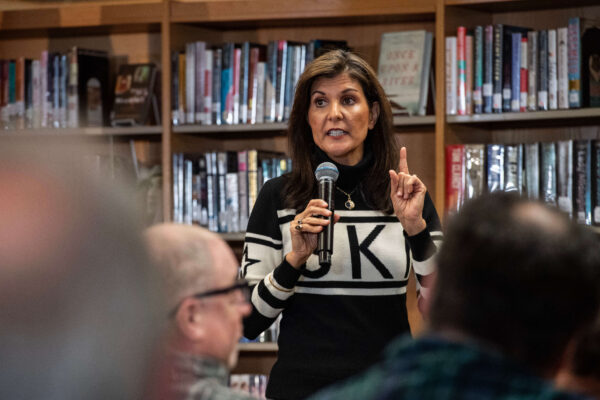Republican presidential hopeful Nikki Haley attempted to walk back comments she made at a New Hampshire town hall on Wednesday night, facing a firestorm of criticism for refusing to mention slavery when responding to a question about the cause of the Civil War.

Following the disastrous moment, Haley’s campaign scrambled to do damage control, swiftly releasing a radio interview in which Haley said, “Of course the Civil War was about slavery,” while calling it “a stain on America” before reiterating that “individual rights and liberties matter for all people.”
The audience member, only identified as Patrick, said he was astonished by Haley’s answer in which she suggested the government played the biggest role in causing the war by limiting “the freedoms of what people could and couldn’t do.”
The questioner, who was handed a mic, asked Haley “What was the cause of the United States’ Civil War?”
Before responding, Haley took a moment to collect her thoughts, and with an audible sigh, seemed a bit uneasy and initially stumbling through the answer, saying, “Well, don’t come with an easy question or anything” before briefly explaining, “I think the cause of the Civil War was basically how government was gonna run, the freedoms and what people could and couldn’t do.”
)It was about slavery. https://t.co/q9bTDvtPne
— Joe Biden (@JoeBiden) December 28, 2023
At that point, Haley redirected the question to Patrick, asking “What do you think the cause of the Civil War was?” which prompted the reply, “I’m not running for president.”
Now without the mic and barely audible, the audience member noted that Haley’s answer as a candidate for the White House was more important than his own point of view.
Back on the spot, Haley attempted to explain that the Civil War was caused by government getting in the way of individual freedoms, religious liberties, and economic pursuits — leading the audience member to scold Haley.
“In the year 2023, it’s astonishing to me that you answer that question without mentioning the word ‘slavery,’” the man said.
Annoyed, Haley replied, “What do you want me to say about slavery?” before the man ended with “You’ve answered my question, thank you,” and Haley moved on, while emphasizing, “Next question.”
Video of the exchange went viral on social media the same night, with many prominent voices weighing in on the controversy.
“It was about slavery,” President Joe Biden posted on the platform X along with the footage of Haley, who was dressed casually in blue jeans and a sweater.
Vermont Bishop Talbert Swan, as well as other Black leaders, also called out Haley.
“Nikki Haley tries to flip a question about the cause of the American Civil War back to a member of the audience because she doesn’t want to acknowledge the historical reality of America’s 246 year enslavement of Black Africans and their descendants,” Swan posted to X, adding “The correct answer is SLAVERY, Nimrata,” — a reference to Haley’s birth name.
Over 10 hours later, Haley was singing a different tune.
During an interview with radio host Jack Heath, Haley claimed slavery was an understood answer. “We know that. That’s the easy part of it. What I was saying was, what does it mean to us today? What it means to us today is about freedom.”
“Yes, I know it was about slavery,” she added. “I’m from the South, of course, you know it’s about slavery.”
Haley even suggested the question was asked by a Democrat plant.
“(He) was definitely a Democrat plant. That’s why I said ‘What does it mean to you?’ And if you notice, he didn’t answer anything,” Haley said. “We see these guys when they come in, we know what they’re doing.”
Recent polls show the former South Carolina governor gaining momentum after her strong showing in the early GOP debates, with the only female candidate running second place to former President Donald Trump for the Republican nomination.
Haley’s profile was especially rising in New Hampshire after picking up a major endorsement from Gov. Chris Sununu two weeks ago, but she still trailed by a large margin, holding sway with 13 percent of Republican voters compared to 51 percent for Trump.
The race tightened in New Hampshire, where polls showed Haley closed the gap with the front-runner by 15 points earlier this month, with Trump leading at 44 percent, compared to Haley’s 29 percent.
Haley’s other biggest Republican rival, Florida Gov. Ron DeSantis, appeared to be losing ground with voters amid several shakeups in his campaign as he trailed Trump by double digits in all the early voting states — setting up a critical first showdown with Trump and Haley on Jan. 15, with DeSantis seemingly needing a miracle to win.
He also shared the video of Haley’s exchange at the New Hampshire town hall, along with the quip “Yikes.” Adding to reporters during a campaign stop that Haley isn’t ready for primetime.
“I think that that’s what you saw yesterday. Not that difficult to identify and acknowledge the role slavery played in the Civil War, and yet that seemed to be something that was really difficult.”
“If she can’t handle a question as basic as the cause of the Civil War, what does she think is going to happen to her in a general election,” DeSantis spokesman Andrew Romeo wrote on X Thursday.
DeSantis didn’t miss an opportunity to elevate the Republican Party that was “founded to put a stop to the growth of slavery in this country. And the abolition of slavery was — and to this day, remains — the party’s top achievement.”
However, DeSantis faced his own slavery controversy early in the campaign when Florida implemented new education standards that required the teaching of a false and infuriating notion that slavery developed skills that ultimately benefited Black people.
The DeSantis-backed legislation drew swift condemnation from U.S. Sen. Tim Scott of South Carolina, the lone Black Republican in the Senate, who at the time asserted that slavery was about “separating families, about mutilating humans, and even raping their wives.”
Questions about the Civil War’s legacy remain significant in Haley’s home state of South Carolina, where she’s faced scrutiny on the topic in the past. Back in 2010, during her gubernatorial campaign, she characterized the Civil War as a clash between two sides — one advocating for “tradition” and the other for “change.”
The same year, she also stirred controversy when she said the Confederate flag, which is widely seen as a symbol of racism, was “not something that is” inherently racist, and initially expressed support for keeping the flag above the state capitol.
Five years later, however, Haley called for the removal of the Confederate flag following the 2015 murders of nine Black church members in Charleston by a 21-year-old white supremacist.
The declaration that led to South Carolina’s secession from the United States in 1860 mentions slavery in the first sentence, while citing growing animosity from states that didn’t allow slavery as the primary reason for the state’s decision to break with the union.
South Carolina Democratic Party chair Christale Spain called Haley’s response “vile” and “unsurprising.”
“The same person who refused to take down the Confederate Flag until the tragedy in Charleston, and tried to justify a Confederate History Month,” Spain said about Haley in a post on X. “She’s just as MAGA as Trump,” Spain noted, referring to Trump’s campaign slogan ”Make America Great Again.”


